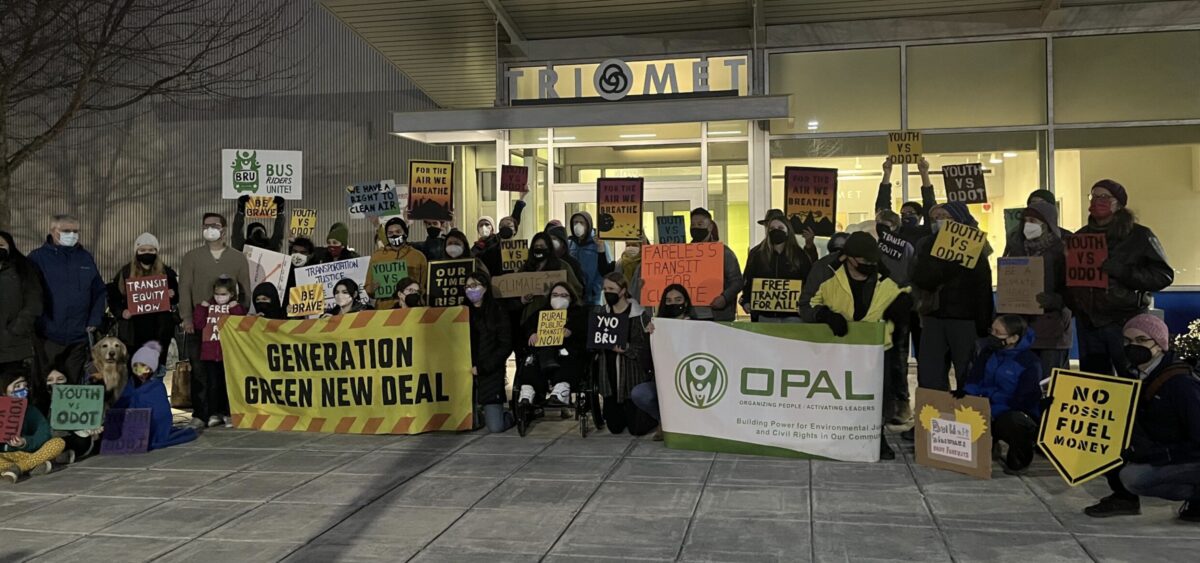
(Photo: Taylor Griggs/BikePortland)
On Transit Equity Day last Friday afternoon activists teamed up for a rally to advocate for public transit investment in the Portland Metro area.
“TriMet must see itself less as a business, and more as a provider of a fundamental human right.”
— Maia Vásconez-Taylor, Bus Riders Unite
The rally was staged outside TriMet headquarters in southeast Portland, and included activists from Bus Riders Unite (OPAL Environmental Justice Oregon), Youth vs. ODOT (Sunrise PDX) and other community groups.
Transit Equity Day is celebrated on Rosa Parks’ birthday to commemorate how she pushed for all people to have equal access to public transit. Parks’ initiation of the Montgomery Bus Boycott in 1955 was foundational to the Civil Rights Movement.
But activists speaking at the rally said that segregation and inequity are still very present in public transit today. They made the connection between accessible, frequent and fare-free transit and the climate crisis, saying that if we want to take serious climate action and get people to drive less, governments need to invest more in public transit and bike infrastructure and less in building and expanding freeways.
Cassie Wilson, a climate, transportation and disability activist who co-founded the Sunrise Movement’s Rural Oregon chapter, talked about her experience navigating transportation as someone who uses a wheelchair.
“I will never be financially secure so long as I’m dependent on a car to get around.”
— Cassie Wilson
“Next month I’m spending every dollar I’ve ever saved on a wheelchair lift for my van…It feels like it will never really end, because I’ll always be having to save for the next thing, like repairing my brakes or renewing my insurance,” Wilson said. “I will never be financially secure so long as I’m dependent on a car to get around.”
Advertisement
Speakers at the rally added that people of color and those with low-incomes also face barriers when it comes to being able to get around without having to rely on a car.
“The burdens of our inequitable transportation system are placed on people already burdened by other systems of oppression,” Wilson said.
Back in September we reported on an Oregon Department of Transportation study that showed race and income are directly correlated to rates of deaths and injuries among road users.
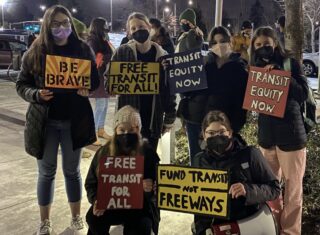
(Photo: Taylor Griggs/BikePortland)
People of color are overrepresented in traffic fatalities in Portland, and people who live in lower-income neighborhoods farther from the city center, like in east and north Portland, don’t have the same access to public transit as people who live in wealthier parts of town.
As the sun went down behind the TriMet building and the air started to get chilly, activists at the rally led the group in a series of chants. “We are unstoppable, another world is possible! We are unstoppable, better transit is possible!” the group sang. The famous union anthem “Which Side Are You On” also rang out from the rally, putting a sharp point on activists’ ask that TriMet and the Oregon Department of Transportation choose public transit investment instead of freeway building.
A few TriMet employees, like Multicultural Programs Manager Martín González, showed up at the rally in support of the protesters. Elected officials like Hoa Nguyen, who serves on the David Douglas School Board, and Nadia Hasan, who is on the Beaverton City Council, spoke as well.
“Oregon has some of the highest chronic absenteeism rates in the country. Kids just aren’t coming to school,” Nguyen said. She added that lack of access to transportation is a big reason that kids can’t get to school on time or at all, and wants to do more work to connect TriMet services with public school districts.
Overall, the message at the rally was that public transit is a right, and people shouldn’t be exploited for a profit just because they want to be able to get around freely. Activists called on TriMet to choose serving the people of the Portland Metro area over making a profit.
“TriMet must see itself less as a business, and more as a provider of a fundamental human right. It should be accountable first to its riders,” Maia Vásconez-Taylor, Community Organizer for Bus Riders Unite! said. “Rider demands should be prioritized above any budget, any profit or making any bottom line.”




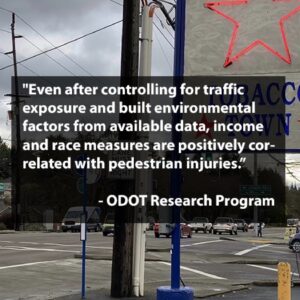
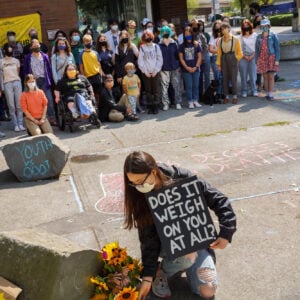
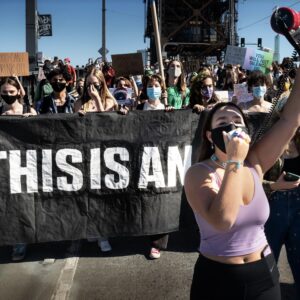
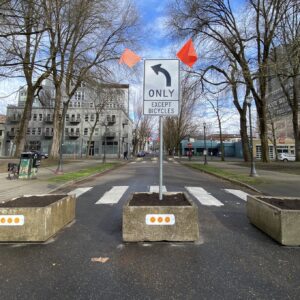
Thanks for reading.
BikePortland has served this community with independent community journalism since 2005. We rely on subscriptions from readers like you to survive. Your financial support is vital in keeping this valuable resource alive and well.
Please subscribe today to strengthen and expand our work.
“Activists called on TriMet to choose serving the people of the Portland Metro area over making a profit.”
For various reasons, US transit agencies don’t turn a profit, and TriMet is no exception. So, it’s really a matter of balancing where and how to serve various parts of the region with available tax revenues. That said, the more paying customers TriMet gets, the more funds it can use to spread out and increase transit service. A free transit system would require an additional or increased funding source. The roll-out of the low-income fare was intended to address the cost concerns of low-income communities. I can’t imagine $2.50/day (low-income fare) is a significant cost to folks making a minimum wage of $14/hour (Portland metro). It’s the other things that are squeezing people, like rising housing costs, medical bills, food, inflation, etc. TriMet is also in the unenviable position of following the migration of lower-income folks out to the suburbs due to higher costs of housing in inner city neighborhoods. Lower density neighborhoods are more expensive to serve and the low density plus lack of sidewalks makes anything but driving very challenging for the people who are most cost-constrained. The region has done a great job of locating affordable housing developments along major transit corridors, and that’s definitely part of the solution, as is infill development to support more walkable and transit-friendly communities. People going back to offices, etc. and commuting via transit will also support the transit system with more cash to expand service, as will regional tolling. And of course, TriMet needs more drivers which I just read they are offering $2,500 hiring bonuses! (side rant: Good grief. With all the homeless out there, I think some one them could use that bonus plus a $23/hr wage to improve their situation). I appreciate the pressure the activists are keeping on TriMet and ODOT, but hopefully they realize the solutions to these challenges facing TriMet require a multi-faceted approach.
TriMet gets 8-18% of its funding from fares.
Public transit should be free. We don’t ask libraries or fire stations to raise parts of their budgets from user fees because we know everyone should have access to them.
Or, perhaps more relevant to BikePortland, we don’t charge people fees to ride on an MUP, walk through a park, or drive down Burnside because paths, sidewalks and roads are part of a city’s infrastructure. TriMet already recognized that fare enforcement fines were making their service worse, not better, and despite the budget hit it (mostly) eliminated them. The fares themselves should be next.
And when some misanthropic creep jumps on this thread to say we need fares on TriMet to keep people experiencing homelessness from riding it, it just underscores that these fares are not meant to fund the service but are used to exclude people out of cruelty. Even if you accept the dystopian idea that we should prevent “undesirable” people from accessing public services, is that more important than climate goals? Los Angeles’s version of Metro (also called Metro), for instance, is exploring using congestion pricing to fund free transit (LA transit’s farebox recovery is 17% of its budget), with the explicit purpose of reducing climate impact.
Kansas City; Talinn, Estonia; and the country of Luxembourg have made public transit free, along with lots of other small cities. If Portland, Metro, and ODOT really wanted to put their money where their climate pledges are, they’d make Portland the next one.
So yes, “additional or increased funding source[s]” are necessary — because we shouldn’t just make public transit free, we should make it vastly more frequent and accessible. And hey, if ODOT can plow tens of billions of dollars into freeway expansion, there’s plenty of money to go around; surely we can hire more drivers at better pay, build some new Rose Lanes to make bus skip-queues the norm, expand BRT, and make all Max trains physically accessible.
Making public transit free also disentangles the necessity of mass transit from the vagaries of ridership. You point out that “the more paying customers TriMet gets, the more funds it can use.” That’s a bug, not a feature. To use my analogy again, we don’t hope for more house fires in order to fund the fire department.
tl;dr Public transit is a public good, and we should act like it.
(References are available by googling; if I insert links here it’ll get flagged as spam. According to publicly-available TriMet budget PDFs, fare revenue for 2020 was $81k out of a total revenue of $850k [9.5%]; of course that was a down year. In 2018, fare revenue was 17.4%.)
10 thumbs up. Thoughtful and rational.
Will take some political capital and leadership.
Locals can’t do it all, we have 2 senior Senators and long term congresspeople that don’t seem to help out a city in need in their state.
Contact them..
Do you really think that the reason people are concerned with the transit system feeling a bit like a rolling shelter is because of “cruelty”? I want transit to feel safe and welcoming and, dare I say it, pleasant to use for people who are going to places. Call me misanthropic, but I doubt I’m the only one who doesn’t want to deal with people who are high, behave erratically, are partially clothed, wear their mask on their forehead, or offer me a bite of their muffin (the gesture was nice, but the way the offerer kept loudly arguing with god and staring at my wife made us both so uncomfortable we changed cars). These are all things I saw on my Christmas Eve Max ride. It will be a while before I try again.
When I use transit, I want to be in the company of others who generally follow the rules, don’t demand my attention, and can keep their clothes on in the middle of winter. I want transit to work well, to be clean, to be safe, and to feel safe. Most of all, I want people who have alternatives to ride transit by choice.
So no, it’s not cruelty that motivates people to support fares; it’s a desperate desire for transit to work better, to prove that it can be an alternate to driving, to provide a hassle-free ride for people who need it or just want it. If I thought making transit free would bring us closer to this vision, I would support it in a second.
Max currently runs on the honor system, so it’s effectively free for a lot of folks. As my last ride showed, eliminating fares works out pretty much exactly like opponents fear it will. And, as a result, a great many transit riders have switched to using their cars, which is making it that much harder for us to meet our climate goals.
I too want a safe transit system. I’m so tired of the free-for-all on the MAX train. I ride early morning and there is ZERO Trimet presence except for the isolated driver. I’m no shrinking violet, so I try to appear as large as possible. I’ve come to the aid of others because of miscreants riding the train. We should not have to resort to that just to ride public transit.
At one time I would have considered opening the system up to be free, but no more.
I’d be all for social service agencies having free bus tickets to give out to folks in need of transportation.
totally agree. My daughter rode the MAX on her own in 6th/7th grade. Now she is freshman and is driven to school because the MAX is an unsafe shitshow. IT IS NOT SAFE OR CLEAN AND IT DOES NOT FUNCTION AS AN ALTERNATIVE TO DRIVING.
This has been our family’s experience too. Our kids rode MAX and bus for several years (including daily from Peninsula Park to Roosevelt High) but now they avoid public transit because they don’t feel safe. I will add that they are also teens so it’s hard to know what the hell they are really thinking and why they think it TBH.
Love your last sentence, JM. I needed a laugh. Our teen daughter had been taking the bus most days to high school downtown from NE but with the darker post-school days, we’ve been having to pick her up several days a week. She says she isn’t comfortable waiting in the dark for the bus — nor riding it at that time of day — and I don’t blame her at all.
Yet if I suggest that Linda Simmons and other tri met heads should be fired for incompetence you think I am being rude….
Did I right this right? Is Jonathan Maus (Portland liberal failed policy apologist extraordinaire) actually agreeing (sort of) that we have a crime problem in Portland? Of course he tries to soft pedal it a bit saying it’s just his silly teenagers that are saying this. But wow, the pendulum is swinging.
Your comment makes it clear you don’t know me or my beliefs at all.
No, I want a ride free from harassment.
Ok, we open up public transit for all. What do you suggest happens to the person who starts harassing fellow riders? Who enforces some modicum of rules to make rides pleasant for everyone?
A few years ago I would have been for free rides for all. But I’ve seen way too much for the non-payers who do harass people. Note, I say non-payers. I’ve seen plenty from non-housed and housed so it’s not isolated to just one segment of society as you think.
I used to take my kids on MAX all of the time. I’ve only ridden a few times since Covid started, but from what I’ve experienced, I wouldn’t take them on the trains. The elimination of uniformed fare enforcement is not going to help boost ridership.
“Talinn, Estonia”
https://www.eltis.org/in-brief/news/estonias-free-county-public-transport-did-not-fulfill-goals
Just to clarify, I support free transit from a social justice perspective but cage-use is so embedded in our culture and economic system that I doubt it can be weakened without very strong disincentives (infrastructural and monetary).
Right, from an equity perspective free-fares make good sense (as long as the lost revenue is recovered in general taxes). From a ridership perspective it does very little. Top priorities on that front are increasing speed, frequency, and safety – in order of what’s most lagging on the system. The first two typically have high upfront capital costs. How to properly improve safety is contentious and depends a lot on who feels unsafe and what is making them feel unsafe.
Just want to point out that the figures you’re citing are in millions, not thousands. So that’s about $100 million in a normal year that the region would need to find to make transit free. As the commenters below note, opening up transit to anyone for free will be a literal $hitshow. Maybe some countries with a solid social safety net can safely do this, but all one needs to do is take a walk through Portland to realize our social safety net is the pavement on the road. This is why we can’t have nice things.
Thank you for deftly explaining the concept of a public good. It is exactly the kind of services that revenues from taxes are supposed to provide.
Almost anyone who wants work can find work these days.
Doesn’t mean the work they find is going to pay them enough to live.
Then why don’t folks move to places where they can have a job and live? Seems that trying to work and live in the core of Portland isn’t tenable for a lot of folks.
I’m highly fortunate to have a job now. But I’ve been there when I didn’t and I had to put food on the table for the 2 of us and I picked up all sorts of temp work. I hated it, but we had to eat. Seems that all too many want the perfect job and won’t settle for something that at least pays the bills while they look for the perfect job.
Life ain’t easy but sometimes you have to go outside your comfort zone. I suck at that like anyone else, but it’s how I got ahead.
I’m a CNA wipe ass and compress chests to net 14.40 an hour. Tell me I don’t deserve better pay. Likewise, tell that to the people who pick and pack your food, who clean every store, who drive buses…the list goes on. Americans who work are underpaid. Just because you made it work before, doesn’t mean that you ought to have been made to. Why do people always fall back on this dumb argument? “I had it hard, so other people should to.” No, in fact, you should’nt have had it hard, in the first place!
They seem to be rallying in the wrong place. If you want free transit, the funding has to come from somewhere. Start with City Hall, or head down to Salem. Trimet could offer free transit, but they would have to cut service somewhere. You can’t squeeze blood out of a turnip.
You’re absolutely right that the funding we need for transit will almost certainly come from the legislature someday, but to be clear, the youth have held protests outside Metro and ODOT already, and will be going to other government agencies in the future. They have also written hundreds of postcards to the legislature opposing freeways and pushing for investments in transit. TriMet’s board absolutely could be louder and bolder in pushing for proactive investment in Salem. There’s value in making sure every set of elected leaders and every government agency is feeling some pressure to ask themselves what role they can play in championing reform in transportation.
Trimet isn’t a government agency. Are you suggesting they are?
…? yes, TriMet is in fact a government agency.
https://trimet.org/about/governance.htm
I support fare free transit, but I think the conversation ignores that the other demand they’re making is to have frequent transit in more places. Until we have frequent transit for everyone (which we desperately need), we should continue to have low income fare programs. If you could find 15% of TriMet’s budget to replace fares, I would argue that we should just use to expand service rather than make fares free. Someone like me should continue to pay until we have enough revenue to have frequent service for everyone. Only then do I think it should be free for me. As for lower income folks, we should make it extremely easy and free to ride transit. Transit passes should come automatically with SNAP benefits, free school lunch eligibility, low income housing, etc.
Hippodamus, you’ll note that the protestors were pushing for both fareless transit *and* for better and more frequent transit service. These two causes aren’t mutually exclusive, and both are important.
As a current TM employee I have some thoughts.
I dare anyone who thinks transit should be “free”, including all these keyboard quarterbacks and do-gooders to ride TriMet and tell me how they like sharing a bus/train with a cacophonous menagerie of unmedicated, unsupervised folks.
Fare collection, or at least the fig-leaf of it, is the only thing standing in the way of the system devolving even further into a shuttle truly only for the indigent, can haulers with 50gal trash bags leaking can juice and thieves with carts piled high with (your) stolen bike parts. Their disruptive and menacing behavior has driven away almost all our paying customers with delays for medical, police and biohazards becoming a daily and often hourly occurrence.
Asking the transit system to serve them to the detriment of law-abiding hard working people who pay a ton in taxes to make it all run, does them and us a great disservice. And if you really don’t care about the other riders, why not go all-in, remove the seats, leave them idling 24/7 in the Expo Center parking lot to provide shelter without any of the ancillary hassles.
I’ve said it before and I’ll say it again: fast, safe, reliable transit you actually want to use OR rolling homeless shelters for the mentally unstable. Choose one. You cant have both.
Thanks Philips, comment of the week! This exactly mirrors my experience. For myself and every neighbor I know: 3-4 years ago we encouraged our kids to develop independence, take the MAX/bus places. NOW, no one lets their kids on it. Adults have all stopped using it. It is unsafe, unclean and not an alternative to driving
I think it bears asking, do you think any of the “cacophonous menagerie of unmedicated, unsupervised folks” is being kept off the MAX for fear of fare enforcement?
Yes. And apparently so or these people loudly advocating for fare-free transit would not be all up in arms. Though I admit it is not entirely effective because we do not enforce fare enough.
There are so few tools left to remove disruptive and dangerous passengers because the TM board and executive team want to feel like they are being compassionate rather than having to make hard calls about what is acceptable behavior on transit. Side rant: It’s really emblematic of the ascension of a liberal elite who have sought to segregate themselves such that they don’t have to deal with the consequences of their actions while the working and lower class suffers. Same with police reform, city council, etc. Those clamoring loudest are not having to deal directly with the consequences of basically advocating for a relativistic, sliding-scale application of law and justice.
Paid for by taxes is not free, Phillips. I suppose that doesn’t matter to you, though.
Yay activists! Activists always have the best solutions derived from their extensive technical experience and superior moral fibre.
Couldn’t not notice the big sign from OPAL in the photo. This group signed that insane letter of opposition regarding the recent banning of camping in dangerous high traffic areas. I will therefore now completely ignore this protest and I hope Trimet does the same. I don’t have time or energy for irrational people.
https://bikeportland.org/wp-content/uploads/2022/02/Response-to-Emergency-Declaration-on-sweeping-camps-FINAL.pdf
Thank you for the fantastic article, Taylor, and for your coverage. It was a spectacular event and I’m glad to see it get coverage.
I see a lot of folks in the comment section offering some critiques about specific policy ideas or nuanced analysis about how we fund transportation investments. While I certainly don’t disagree that the devil is in the details and that we need to be sharp in our analysis, I’m seeing a lot of armchair quarterbacking from a bunch of people heckling from the sidelines while a bunch of teenagers are literally putting their bodies on the line to organize and call attention to the enormous transportation injustices in our local, regional, and statewide funding mechanisms. Whether or not you agree that “making transit free” should be the top priority, I imagine you broadly agree that transit should be better, more effective, and certainly cheap and not more expensive than it is at present. Getting weighed down in these specifics as an excuse to dismiss or ignore these badass fifteen year olds begging for adults to join them, as opposed to asking ourselves how we can elevate their absolutely righteous cause (and maybe occasionally offer some guidance and perspective) to push for bold transportation reform feels like a disservice.
Heckling? Armchair?
ABSOLUTELY!
I’m not the type that goes to protests. Do I support them? Maybe, depends on the issue. Do I attend forums or debates? Nope.
What’s my “weapon” or “superpower” of choice? My VOTE. I use it every chance I get.
Not everyone is cut out to be a protester and for some to be so dismissive of those of us who chose a different way to be agents of change really uncalled for. Afterall, it’s likely going to be my donation of $$ to a cause that will help those teenages succeed.
Really, not all of us are protest warriors. Forums like this is where we do our “protests”.
I presume you’d rather we all just be quiet and not talk about the issues from different angels, unless of course they agree with yours?
Have a swell day. Going back to my dungeon until the next “protest”.
Well, you *are* here. And you do seem to be in the Bikeportland comments section fairly often.
Forums and debates as in events that are typically held at a venue. Sorry that clarrification was needed.
“ a bunch of teenagers are literally putting their bodies on the line ”
They carried signs in front of a building.
Portlanders with no choice but to ride the public transit gauntlet of our post-apocalyptic utopia, who are actually “putting their bodies on the line” every day: latchkey children, low-income commuters, disabled folks, and TriMet employees.
As I understand it fares generate very little net revenue beyond the cost of collecting them. They are a means of regulating use. The primary cost of eliminating them is that it results in slower service by requiring buses to stop more frequently for people hopping on and off in place of walking. This means more busses and drivers are required to provide the same level of frequent service. There is also the security issues, how do you deal with disruptive passengers and the impact that has on transit use by choice.
Trimet built a great transit system by attracting users who had other options. When you focus only on those who are transit dependent you end up with a welfare system that provides terrible service to those who are dependent. The system culture becomes spending as little as possible to provide the least service that is absolutely essential. The primary victims of that are not the folks who can afford a car and parking.
I support a fareless system. But it’s important to realize the issues it creates go beyond finances. It’s going to be tough to achieve when there are thousands of people with no private space who are trying to live in public. A warm bus is better than a cold street.
The larger problem will remain even after the region gets a handle on the homeless. How do you get people out of their personal car to use public transit. The real answer to that is by NOT investing in making driving easier. There is plenty of space for homeless camps in all the parking garages and lots. But they have a more use, providing a convenient public place for people to park their personal car. It’s a problem of priorities.
Activists rarely solve problems. But without them nothing would ever be done. Their role is to instigate change. With enough pressure politicians figure out how to deal with difficult conflicts. Without pressure, they just reward the people who support their campaigns and buy them lunch.